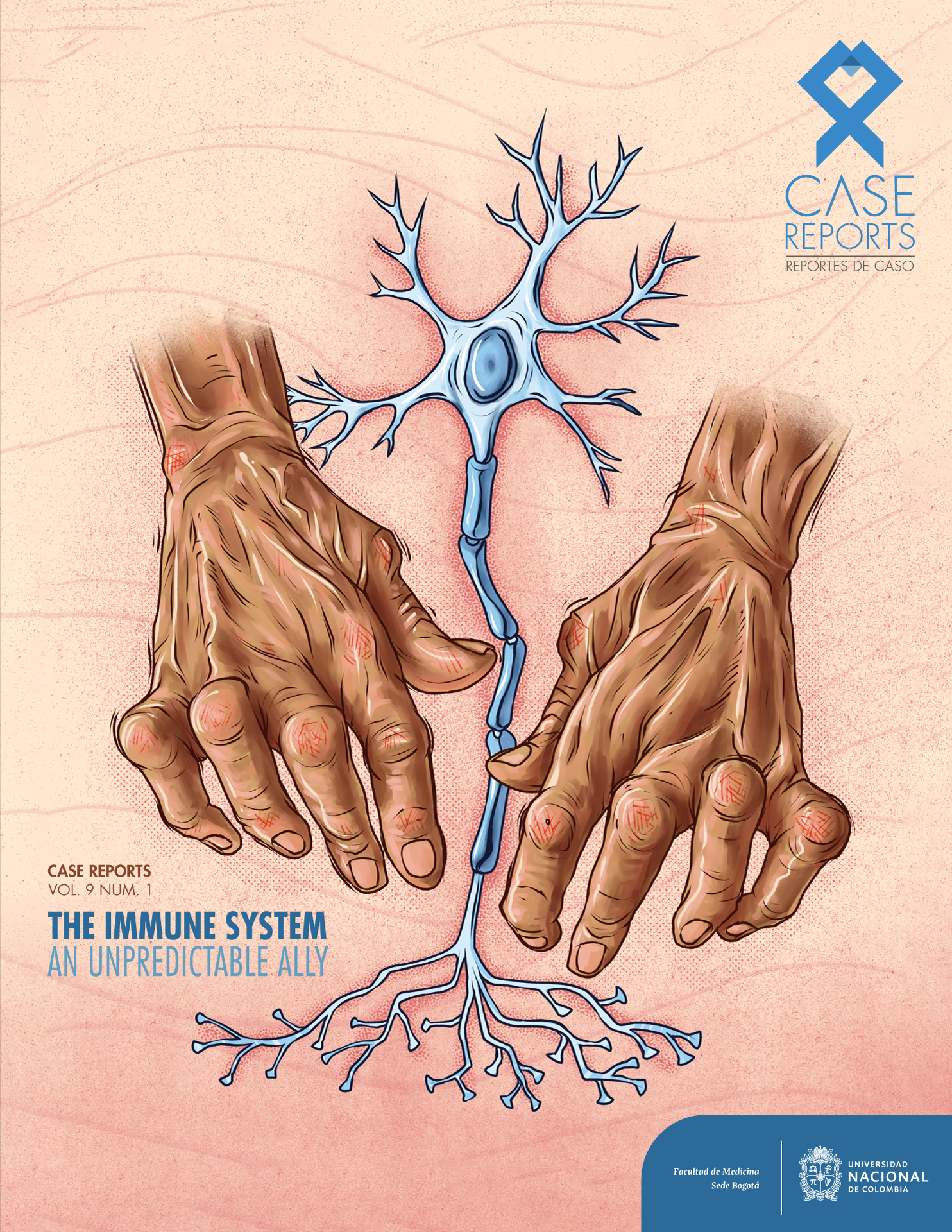El sistema inmunológico, un aliado impredecible
The immune system, an unpredictable ally
DOI:
https://doi.org/10.15446/cr.v9n1.109404Keywords:
Sistema Inmunológico, Medicina, Sistemas Médicos Complejos, Medicina Neuralterapéutica (es)Immune System, Medicine, Complex Medical Systems, Neural Therapy (en)
https://doi.org/10.15446/cr.v9n1.109404
The immune system, an unpredictable ally
Keywords: Immune System; Medicine; Complex Medical Systems; Neural Therapy.
Eduardo Humberto Beltrán-Dussán
Universidad Nacional de Colombia
- Faculty of Medicine -
Department of Public Health
- Bogotá D.C. - Colombia.
Corresponding author
Eduardo Humberto Beltrán-Dussán.
Departamento de Salud Pública,
Facultad de Medicina,
Universidad Nacional de Colombia.
Bogotá D.C. Colombia.
Email: ehbeltrand@unal.edu.co
Received: 24/04/2023 Accepted: 05/05/2023
Editorial
One of the most important developments in the history of science and medicine was the discovery and subsequent description of what is now known as the immune system, which is considered to be one of the major protective mechanisms of the human body (1). The immune system is associated with inflammation processes resulting from the protective action of the organism. There is a non-specific or innate immune system, which protects the individual from general pathogens. There is another very specific and elaborate immune system, also called adaptive, which involves cellular activity together with a series of mediators (through activating and inhibiting actions), whose purpose is to maintain various processes for the identification of one’s own structures to protect them from foreign agents and to eliminate or deactivate them during life support processes (2).
The progress of scientific knowledge in the field of immunology has allowed the identification of different regulatory mechanisms related to immune response, the structures involved in regulatory process, as well as the correlations existing between the immune system and other systems of the body (3). Among the systems integrated in the regulatory processes, very close relationships have been described between the nervous system and, mainly, the limbic system, as well as with the endocrine system, the digestive system, the cardiovascular system, the respiratory system, the hematological system, etc., ultimately finding a correlation between all the systems of the body (4-6).
It has been recognized that pathological processes arise from the interaction of physical, emotional and mental aspects, and that they can be either inherited since the moment of conception itself or acquired during the course of life. Likewise, it is understood that organic dysfunction is the result of the interaction of risk factors and the specific conditions of a person, which lead to an adaptation process that is maintained until the regulatory capacity is lost and the “excess” or functional defect starts to stand out, thus causing a disease (7-9).
It has also been possible to establish a number of acquired inflammatory, acute or chronic factors triggered by physical, emotional and mental stressors, in addition to inherited factors, involved in the genesis of immunological diseases. They, due to their intensity or persistence of action, alter the proper functioning of the immune system, giving rise to immunodeficiencies, in the case of deficiencies, or autoimmune diseases, when hyperfunction occurs (10).
Many chronic, degenerative and other diseases that are difficult to interpret and treat have been classified as the product of dysfunctions of the immune system (11). These health conditions, which have existed since the beginning of mankind, have been understood and addressed in different ways depending on the medical rationale used at certain moments throughout the history of medicine. In this context, conventional medicine, which originates from the philosophical principles of the identification of causes and their direct treatment, has developed several therapeutic interventions oriented towards the substitution of missing elements or the regulatory treatment of excesses, with the aim of getting closer to the basal conditions required for the optimal functioning of the organism. There are specific therapeutic strategies for substitution or regulation, both of which show evidence of therapeutic outcomes (12). However, throughout the history of mankind, other forms of medical practice (some initiated by ancient civilizations that have since disappeared and others practiced by civilizations that still exist today) have also developed as complex medical systems.
Through the scientific advancement of knowledge, both forms of medicine have integrated, finding explanations for the foundations of each, incorporating the concept of a single medicine for the benefit of patients, and interpreting pathological processes not only as isolated diseases, but as the result of systemic alterations. Such alterations are manifested in the most vulnerable systems of each person depending on their individuality and, using interventions that tend to encompass the entire range of symptoms experienced by the individual (merging with the specificity and directionality of conventional medicine), it is possible to achieve very satisfactory outcomes in patients that are clearly reflected in their quality of life (13).
In this issue of the journal, we present the clinical case of a patient diagnosed with rheumatoid arthritis (RA), categorized as an autoimmune disease (14), who received treatment with neural therapy (NT) together with conventional therapy. NT, as stated in the article, is a medical system that seeks to identify the organic foci of functional dystrophy created by previous traumatic or inflammatory situations that produce interfering information fields, which are then unblocked using microdoses of procaine (15). By eliminating the interfering fields anchored to the nervous system and, therefore, in the other information communication systems, it is possible to regain the biological control of immune response (16), taking into account the correlations that have already been established in the literature.
Combining different approaches to medical practice when treating patients can lead to a better clinical course and, therefore, to an improvement in their quality of life. The most important aspect is that these interventions, both from conventional medicine and other forms of medical practice, must be carried out by qualified professionals, with an academic background acquired through the postgraduate training programs currently offered in higher education institutions, in order to achieve an adequate integration of medicine and, thus, generate research that contribute significantly to evidence-based medicine.
References
1.Kaufmann SHE. Immunology’s Coming of Age. Front Immunol. 2019;10:684. https://doi.org/gjrpvd.
2.Edgar JD. Clinical immunology. Ulster Med J. 2011;80(1):5-14.
3.Saravia J, Raynor JL, Chapman NM, Lim SA, Chi H. Signaling networks in immunometabolism. Cell Res. 2020;30:328-342. https://doi.org/ggp6tb.
4.D’Acquisto F. Affective immunology: where emotions and the immune response converge. Dialogues Clin Neurosci. 2017;19(1):9-19. https://doi.org/j9v5.
5.Barsotti N, Chiera M, Lanaro D, Fioranelli M. Impact of stress, immunity, and signals from endocrine and nervous system on fascia. Front Biosci (Elite Ed). 2021;13(1):1-36. https://doi.org/j9v6.
6.Bitzer-Quintero OK, Ortiz GG, Jaramillo-Bueno S, Ramos-González EJ, Márquez-Rosales MG, Delgado-Lara DLC, et al. Psycho-Neuro-Endocrine-Immunology: A Role for Melatonin in This New Paradigm. Molecules. 2022;27(15):4888. https://doi.org/j9v8.
7.Altshuler D, Daly MJ, Lander ES. Genetic mapping in human disease. Science. 2008;322(5903):881-8. https://doi.org/crtx83.
8.Kalish JM, Jiang C, Bartolomei MS. Epigenetics and imprinting in human disease. Int J Dev Biol. 2014;58(2-4):291-8. https://doi.org/j93h.
9.Benton ML, Abraham A, LaBella AL, Abbot P, Rokas A, Capra JA. The influence of evolutionary history on human health and disease. Nat Rev Genet. 2021;22(5):269-283. https://doi.org/ghsq83.
10.Wang L, Wang FS, Gershwin ME. Human autoimmune diseases: a comprehensive update. J Intern Med. 2015;278(4):369-95. https://doi.org/f7qh43.
11.Gunasinghe SD, Peres NG, Goyette J, Gaus K. Biomechanics of T Cell Dysfunctions in Chronic Diseases. Front Immunol. 2021;12:600829. https://doi.org/j93j.
12.Laín-Entralgo P. Historia de la medicina. Barcelona. 1a Ed. Editorial Masson; 2006.
13.Beltrán-Dussan EH. ¿Qué es Medicina Alternativa Complementaria e Integrativa? Rev. Fac. Med. https://doi.org/j93k.
14.Scherer HU, Häupl T, Burmester GR. The etiology of rheumatoid arthritis. J Autoimmun. 2020;110:102400. https://doi.org/gjj36d.
15.Beltrán-Dussán EH, Urrego DZ. Un Sistema Médico denominado Medicina Neuralterapéutica. En: Beltrán EH, Vega JA, editores. Medicina Neuralterapéutica: un abordaje desde los sistemas médicos complejos. Bogotá. 1ª Ed. Editorial Universidad Nacional de Colombia; 2013. p. 29-49.
16.Chavan SS, Tracey KJ. Essential Neuroscience in Immunology. J Immunol. 2017;198(9):3389-3397. https://doi.org/gdsgzf.
References
References
Kaufmann SHE. Immunology’s Coming of Age. Front Immunol. 2019;10:684. https://doi.org/gjrpvd. DOI: https://doi.org/10.3389/fimmu.2019.00684
Edgar JD. Clinical immunology. Ulster Med J. 2011;80(1):5-14.
Saravia J, Raynor JL, Chapman NM, Lim SA, Chi H. Signaling networks in immunometabolism. Cell Res. 2020;30:328-342. https://doi.org/ggp6tb. DOI: https://doi.org/10.1038/s41422-020-0301-1
D’Acquisto F. Affective immunology: where emotions and the immune response converge. Dialogues Clin Neurosci. 2017;19(1):9-19. https://doi.org/j9v5. DOI: https://doi.org/10.31887/DCNS.2017.19.1/fdacquisto
Barsotti N, Chiera M, Lanaro D, Fioranelli M. Impact of stress, immunity, and signals from endocrine and nervous system on fascia. Front Biosci (Elite Ed). 2021;13(1):1-36. https://doi.org/j9v6. DOI: https://doi.org/10.2741/870
Bitzer-Quintero OK, Ortiz GG, Jaramillo-Bueno S, Ramos-González EJ, Márquez-Rosales MG, Delgado-Lara DLC, et al. Psycho-Neuro-Endocrine-Immunology: A Role for Melatonin in This New Paradigm. Molecules. 2022;27(15):4888. https://doi.org/j9v8. DOI: https://doi.org/10.3390/molecules27154888
Altshuler D, Daly MJ, Lander ES. Genetic mapping in human disease. Science. 2008;322(5903):881-8. https://doi.org/crtx83. DOI: https://doi.org/10.1126/science.1156409
Kalish JM, Jiang C, Bartolomei MS. Epigenetics and imprinting in human disease. Int J Dev Biol. 2014;58(2-4):291-8. https://doi.org/j93h. DOI: https://doi.org/10.1387/ijdb.140077mb
Benton ML, Abraham A, LaBella AL, Abbot P, Rokas A, Capra JA. The influence of evolutionary history on human health and disease. Nat Rev Genet. 2021;22(5):269-283. https://doi.org/ghsq83. DOI: https://doi.org/10.1038/s41576-020-00305-9
Wang L, Wang FS, Gershwin ME. Human autoimmune diseases: a comprehensive update. J Intern Med. 2015;278(4):369-95. https://doi.org/f7qh43. DOI: https://doi.org/10.1111/joim.12395
Gunasinghe SD, Peres NG, Goyette J, Gaus K. Biomechanics of T Cell Dysfunctions in Chronic Diseases. Front Immunol. 2021;12:600829. https://doi.org/j93j. DOI: https://doi.org/10.3389/fimmu.2021.600829
Laín-Entralgo P. Historia de la medicina. Barcelona. 1a Ed. Editorial Masson; 2006.
Beltrán-Dussan EH. ¿Qué es Medicina Alternativa Complementaria e Integrativa? Rev. Fac. Med. https://doi.org/j93k.
Scherer HU, Häupl T, Burmester GR. The etiology of rheumatoid arthritis. J Autoimmun. 2020;110:102400. https://doi.org/gjj36d. DOI: https://doi.org/10.1016/j.jaut.2019.102400
Beltrán-Dussán EH, Urrego DZ. Un Sistema Médico denominado Medicina Neuralterapéutica. En: Beltrán EH, Vega JA, editores. Medicina Neuralterapéutica: un abordaje desde los sistemas médicos complejos. Bogotá. 1ª Ed. Editorial Universidad Nacional de Colombia; 2013. p. 29-49.
Chavan SS, Tracey KJ. Essential Neuroscience in Immunology. J Immunol. 2017;198(9):3389-3397. https://doi.org/gdsgzf. DOI: https://doi.org/10.4049/jimmunol.1601613
How to Cite
APA
ACM
ACS
ABNT
Chicago
Harvard
IEEE
MLA
Turabian
Vancouver
Download Citation
License
Copyright (c) 2023 Case reports

This work is licensed under a Creative Commons Attribution 4.0 International License.
The authors, when submitting their manuscripts, accept to transfer to Case reports the copyright of the published articles. The publisher has the right of use, reproduction, transmission, distribution and publication in any form or medium. The authors cannot allow or authorize the use of the contribution without the written consent of the journal.
Uniform Disclosure Form for possible Conflicts of Interest, the assignment of rights and responsibility must be delivered together with the original.
Those authors who have publications with this journal accept the following terms:
The authors will keep their copyright and guarantee the journal the right of first publication of their work, which will be simultaneously subject to the Creative Commons Recognition License that allows third parties to share the work whenever its author is indicated and his first publication this journal
The authors may adopt other non-exclusive licensing agreements for the distribution of the published version of the work (eg, deposit it in an institutional telematic file or publish it in a monographic volume) whenever the initial publication in this journal is indicated.
Authors are allowed and advised to disseminate their work through the Internet (eg in institutional telematic files or on their website) before and during the submission process, which can produce interesting exchanges and increase citations of the published work. (See The effect of open access).





























